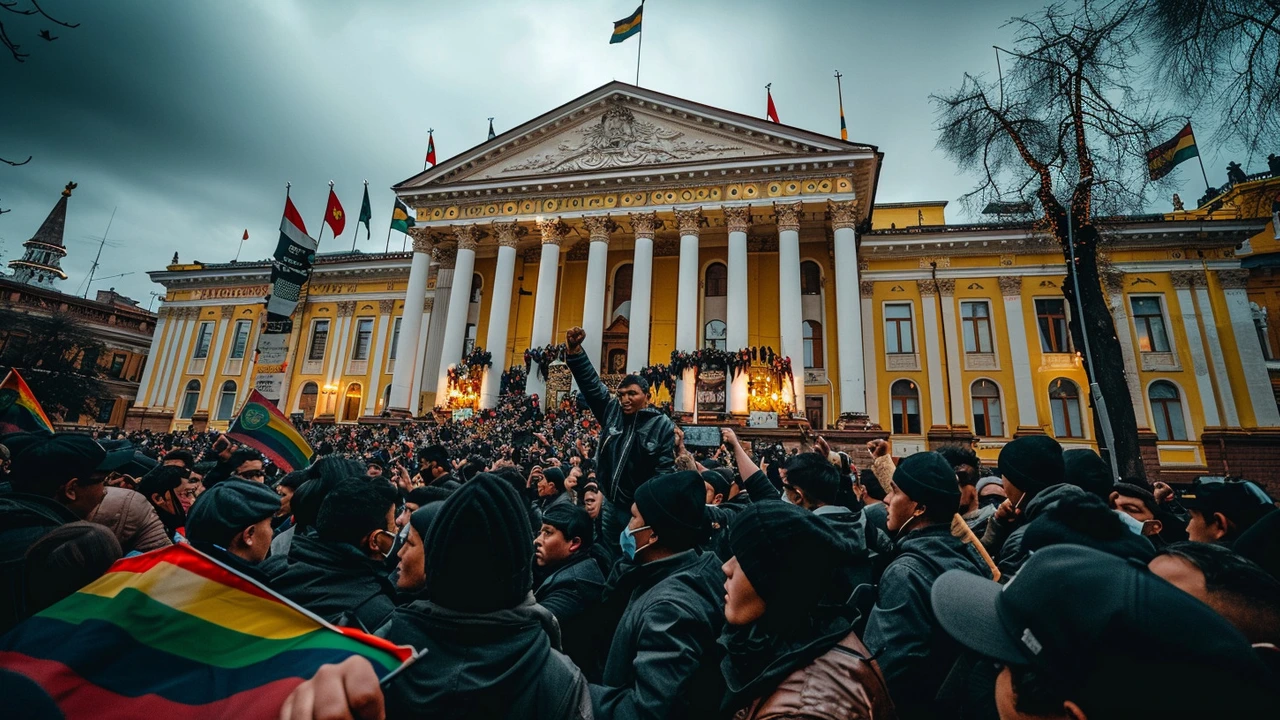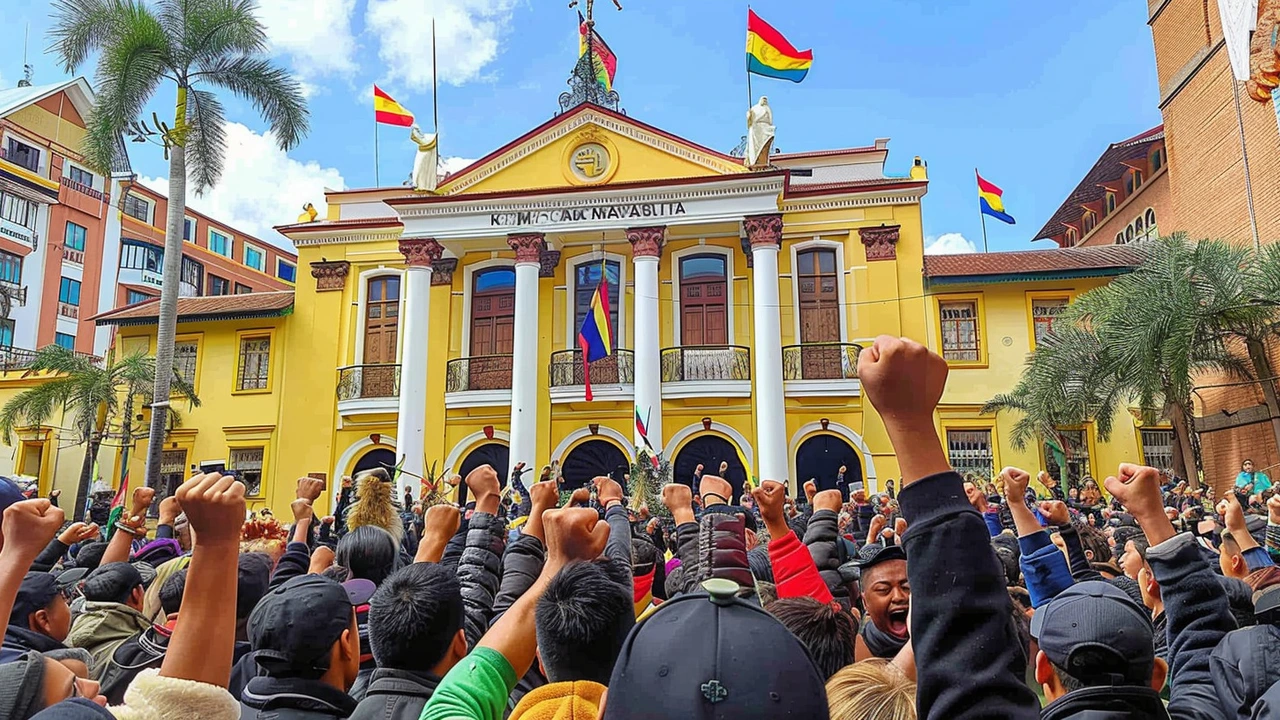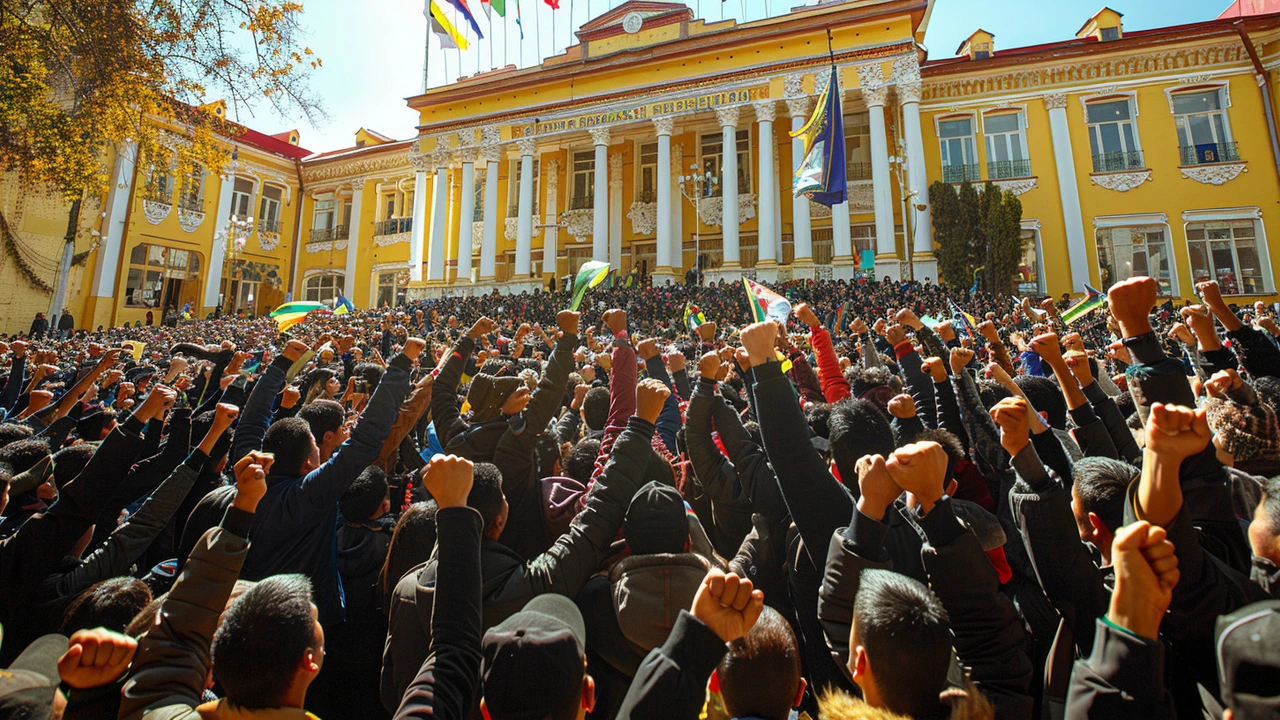Introduction
The streets of Bolivia have become a battleground as military vehicles rolled through the capital, La Paz, creating an atmosphere of fear and uncertainty. As armored units breached the gates of the government palace, concerns about a potential coup have surged. The unfolding drama has drawn intense scrutiny at both national and international levels, with President Luis Arce at the center of this tumultuous scenario.
Confrontation Inside the Government Palace
Within the secure confines of the government palace, President Luis Arce faced a tense meeting with General Commander of the Army, Juan José Zúñiga. This confrontation was not merely a formality but an assertion of authority by a beleaguered leader. Arce demanded the immediate withdrawal of troops, underlining his commitment to democratic processes. In response, General Zúñiga hinted at significant changes within the cabinet, subtly indicating a push for stability while the nation simmered on the brink of chaos.
Evo Morales Weighs In
The shadow of former President Evo Morales looms large over the current political landscape in Bolivia. Morales, observing the military maneuvers near the palace, condemned them as clear indicators of an impending coup. His statements have resonated deeply within the Movement for Socialism (MAS) party and beyond, adding a layer of complexity to an already volatile situation. Morales' influence remains potent, and his words carry the weight of significant experience and authority in Bolivian politics.

María Nela Prada's Rallying Cry
María Nela Prada, a prominent government official, further fueled the discourse by labeling the military's actions as an 'attempted coup d'etat.' Her passionate declarations have galvanized supporters of democracy, calling on the populace to stand firm against any undemocratic maneuvers. Prada's rhetoric underscores the gravity of the current unrest and the urgent need to safeguard the democratic framework of the nation.
International Response and Condemnation
The unfolding events in Bolivia have not gone unnoticed by the international community. Regional leaders and organizations have rapidly condemned the military's movements as a dire threat to democracy. This international reaction highlights the precariousness of Bolivia's political situation and the broader implications for democratic stability in the region. The solidarity shown by neighboring countries underscores the interconnected nature of political stability and the importance of democratic governance.
Context of Economic and Political Turmoil
The current political unrest is set against a backdrop of significant economic challenges and deep internal political tensions. President Arce and his predecessor, Morales, find themselves embroiled in a power struggle within the ruling MAS party. This internal strife is exacerbated by mounting protests and public dissatisfaction driven by economic instability. The contentious approach of both leaders risks further polarizing the party and the nation ahead of the crucial 2025 elections.

The Road Ahead
As Bolivia teeters on the edge of a potential coup, the path forward remains fraught with challenges. The immediate priority for President Arce is to navigate the military's influence and ensure the democratic process is upheld. Simultaneously, addressing the root causes of public discontent, such as economic hardships and political disunity, will be essential in restoring stability. The upcoming elections represent a crucial juncture for Bolivia, with the potential to either reaffirm or challenge the nation's democratic foundations.
Conclusion
The situation in Bolivia is a stark reminder of the fragile nature of democratic governance, especially in the context of economic and political turmoil. The presence of military forces in the streets of La Paz and the palpable fear of a coup underscore the urgent need for cohesive and stable leadership. As the nation grapples with these challenges, the resolve of its leaders and the resilience of its democratic institutions will be critical in determining the trajectory of its future.







Zac Death
The unfolding crisis in Bolivia feels like a textbook case of civil‑military tension spiraling out of control.
When armored vehicles rolled through the streets of La Paz, the sight alone sent shivers down the spine of anyone who values democratic norms.
President Luis Arce’s demand for the troops to pull back was a bold move that demonstrated both resolve and vulnerability.
General Juan José Zúñiga’s cautious hints at cabinet reshuffles suggest a strategic play to maintain a veneer of stability while the power balance remains fragile.
Meanwhile, former president Evo Morales’ warnings about an impending coup add a historical weight that cannot be ignored.
The rhetoric from María Nela Prada labeling the events as an “attempted coup d’état” intensifies the polarization across the political spectrum.
International actors have already issued statements condemning the military presence, which underscores how regional stability is at stake.
Economic hardships that have plagued Bolivia for months only deepen the public’s frustration, making the streets a powder keg ready to ignite.
The 2025 elections looming on the horizon could either cement democratic restoration or further entrench authoritarian impulses.
In such a volatile environment, the role of the military is a double‑edged sword, capable of protecting or subverting the civilian order.
Civil society groups are mobilizing, urging citizens to stand up for democratic processes while avoiding violent confrontations.
The media’s coverage, both domestic and foreign, will shape narratives that could either calm the situation or fan the flames.
It is crucial for Arce to engage in sincere dialogue with military leaders, political opponents, and ordinary Bolivians alike.
A transparent investigation into the motivations behind the troop deployments could restore some trust in institutions.
Ultimately, the resilience of Bolivia’s democracy will be measured by how well the nation navigates this crisis without sacrificing its core values.
Lizzie Fournier
The militarization of La Paz is a stark reminder that democracy needs constant vigilance.
JAN SAE
Wow, the situation is wild, the tanks rolling, the politicians shouting, the crowds trembling-everything feels like a high‑stakes drama!!! I can’t believe how quickly things escalated, how quickly hope turned into fear!!! But we must stay calm, stay informed, stay hopeful!!!
Steve Dunkerley
From a security‑sector analysis perspective, the deployment of armored units constitutes a force‑projection operation that may be interpreted as coercive deterrence, potentially infringing constitutional safeguards; moreover, the command hierarchy’s signaling to both domestic and international audiences appears deliberately ambiguous.
Jasmine Hinds
We need to keep the peace and stand together :)
Madison Neal
I hear you and totally agree; the vibe in the streets is tense, but our solidarity can make a difference, so let’s keep encouraging non‑violent protest and demand transparency from the government.
John Crulz
Seeing the military at the heart of La Paz makes me think about the delicate balance between security and freedom, and it reminds us that any slip can tip the scales toward unrest.
Anita Drake
Indeed, Bolivian culture has always intertwined community resilience with political activism, and this moment could become a defining chapter in how citizens mobilize across ethnic and regional lines.
Eduardo Lopez
The sheer spectacle of armored columns snaking through the capital reads like a scene from a dystopian novel, and it forces every onlooker to confront the terrifying possibility that democracy is being hijacked under the guise of order.
Nancy Perez de Lezama
While the visual is alarming, it is essential to remember that constitutional frameworks exist to check such power, and any deviation should be met with lawful resistance.
Matt Heitz
It is outrageous that the military can parade through sovereign streets without accountability, and anyone who defends this blatant power grab is complicit in undermining the nation’s democratic integrity.
Susan Mark
Let’s focus on concrete steps: public forums, legal challenges, and international monitoring can create pressure points that deter further militarization.
Jason Jennings
Honestly, all this drama feels overblown; politicians love the hype, but the average person just wants stability, not endless headlines.
Diego Vargas
Idk, but the way they spin it makes it sound serious, even tho the actual impact might be less than they claim.
Alex Lee
This is just another circus, and anyone buying tickets is a fool.
Vida Yamini
I understand the frustration, but we must channel our energy into constructive dialogue rather than descending into chaos; the path forward involves inclusive negotiations that respect both civilian oversight and legitimate security concerns. Building trust requires transparency, and each stakeholder should commit to a clear roadmap for demilitarization. Moreover, international observers can play a pivotal role in verifying compliance with democratic norms. At the same time, grassroots movements should remain non‑violent, as violence only erodes moral authority. Historical precedents in the region show that peaceful transitions, though arduous, preserve long‑term stability. Let’s remember that Bolivia’s rich cultural tapestry thrives when diverse voices are heard. Finally, sustained economic reforms will address the underlying grievances that fuel unrest, creating a more resilient society.
James Lawyer
From a legal standpoint, the constitution delineates clear limits on military involvement in political affairs, and any deviation warrants judicial review to safeguard democratic processes.
Abby Culbertson
i cant even... it feels like they just want to scare everyone lol
Awolumate Muhammed Abayomi
yea we gotta stick together an keep an eye on them, democrcy is at risk if we dont act fast